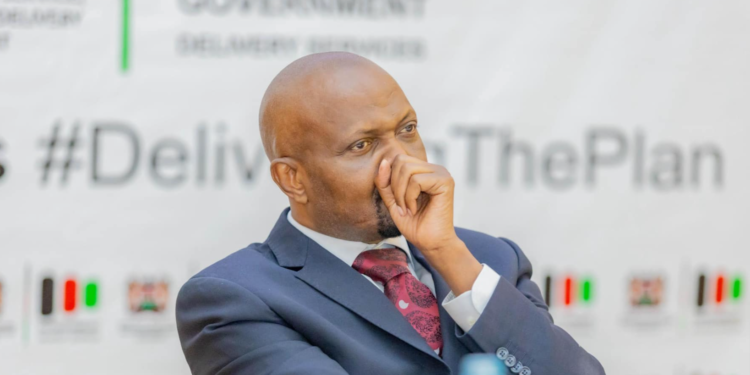The Kenyan government plans to expand its tax collection system through digital platforms like M-Pesa, making it more difficult for individuals and businesses to evade taxes. This move is part of a broader effort to modernize the tax regime and tackle the country’s domestic debt burden, Senior Advisor Moses Kuria revealed at the KRA Summit 2024.
Speaking at the Kenya Revenue Authority (KRA) Summit in Nairobi, Kuria outlined a series of reforms aimed at boosting the country’s tax revenue through technological innovation. The government, he said, will integrate mobile payment platforms such as M-Pesa with KRA’s tax collection systems, allowing more efficient monitoring and reducing the number of people who evade taxes.
“By Christmas 2024, all M-Pesa pay bills will also serve as virtual ETRs [Electronic Tax Registers] for KRA purposes,” Kuria said. “We are going to implement this. There will be nowhere to hide for anybody.”
Tax System Overhaul to Address Debt Burden
The push to digitize tax collection is not just about technology—it is part of a larger strategy to address Kenya’s significant domestic debt. According to Kuria, nearly 30% of Kenya’s tax revenue currently goes toward servicing interest on domestic loans, an unsustainable burden that has led the government to seek new ways to expand its tax base.
Kuria emphasized the urgent need to reduce domestic borrowing by increasing tax revenue. “This year, we will pay KES 750 billion in interest on domestic debt alone. That’s around $6 billion, and it’s catastrophic,” he said.
He added that without increasing revenue, Kenya’s economic recovery would be at risk, as the country would remain reliant on high-interest loans. “We’ve done everything we can on the expenditure side; now we need to work on the revenue side,” Kuria said.
Social Justice and Tax Equity
Beyond economic concerns, the government’s tax reform strategy also focuses on addressing what Kuria called a significant inequity in Kenya’s current tax system. He pointed out the stark disparity between formal and informal sector workers in terms of tax contributions.
“In the formal sector, 3 million people pay KES 500 billion in income taxes. Meanwhile, 16 million people in the informal sector contribute only KES 12 billion,” Kuria noted. For him, this was not just an economic imbalance but a social justice issue.
The government’s goal, he said, is to ensure that everyone contributes their fair share of taxes. “It’s not fair for 3 million people to disproportionately carry the tax burden for 16 million others. We have to modernize our tax system to address this imbalance.”
Leveraging Kenya’s Digital Economy
Kenya’s position as a global leader in mobile payments, largely driven by the success of M-Pesa, has put the country in a strong position to digitize tax collection. Kuria emphasized that Kenya’s widespread adoption of digital payments is a resource that other countries might envy.
“The level of digital payments in Kenya is something that even developed economies could learn from. A person who may not be able to construct a sentence in English can still use M-Pesa for digital payments,” Kuria said, describing the country’s digital infrastructure as “better than the oil of Nigeria” or “the gold mines of Zimbabwe.”
This existing digital infrastructure will play a central role in the government’s tax reforms. KRA plans to harness mobile payment systems to track transactions more effectively, preventing businesses and individuals from underreporting their income. By tying M-Pesa and other digital touchpoints directly to tax systems, the government hopes to close loopholes that have allowed tax evasion to flourish.
No Room for Evasion
Kuria also addressed concerns over privacy and data protection in the face of such expansive digital surveillance, making it clear that the government will not allow data protection laws to be used as an excuse for avoiding taxes.
“The government of Kenya is taking measures to ensure that when it comes to paying taxes, hiding behind data protection and privacy won’t save you. We are going to ensure that data transparency is an obligation for everyone,” he said.
Kuria added that the tax reforms would involve integrating Kenya’s tax systems with those of other countries to curb cross-border tax evasion. By coordinating with customs authorities and trade facilitation systems abroad, the government hopes to ensure full compliance with tax laws.
A Step Toward Broader Economic Reforms
The digitization of Kenya’s tax system is just one part of a broader push to modernize the country’s economy. The government has already successfully implemented digital tools in other areas, including social protection and agriculture. Kuria highlighted the e-voucher system used to distribute fertilizer to over six million farmers as a model for how digital platforms can enhance efficiency and reduce corruption.
Looking ahead, the government is also working to create a unified digital health platform for all 54 million Kenyans. Kuria hinted that this same system could be used to track taxpayers and further expand the country’s revenue base.
“This isn’t just a project; it’s a necessity,” Kuria said, emphasizing the existential threat posed by Kenya’s current fiscal situation. “Modernizing our tax system is not a nice-to-have—it’s something we must do.”


















